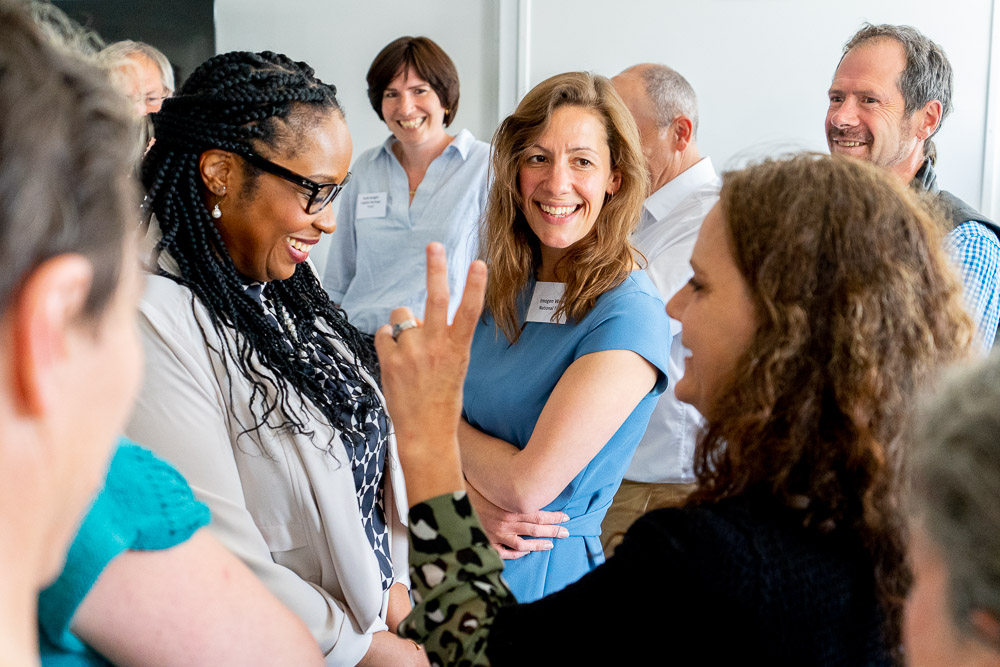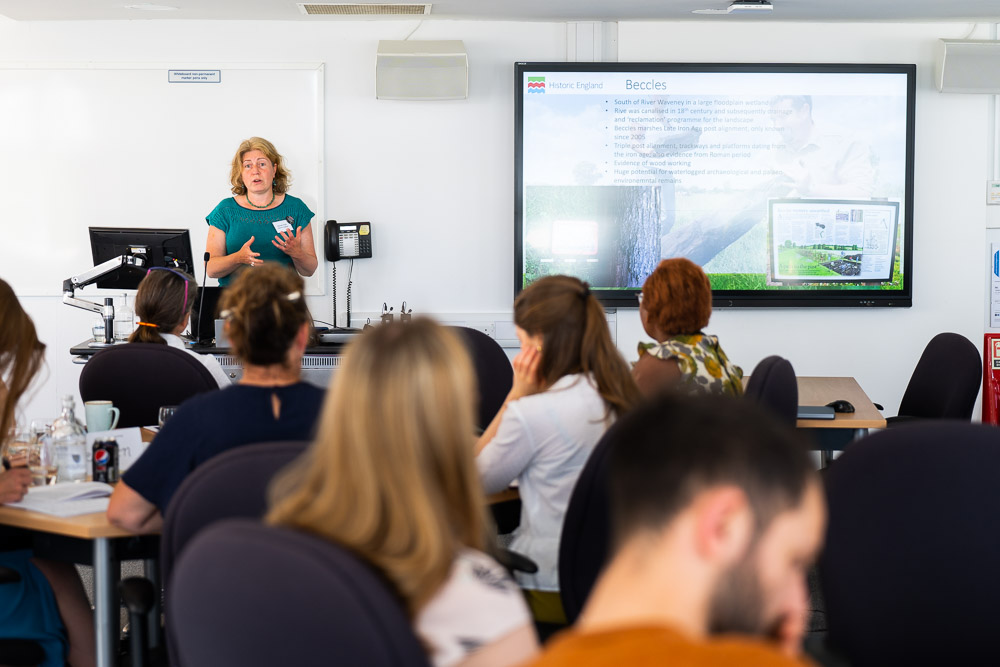On 19th and 20th May 2022, the Walker Institute and its partner, Historic England, co-organized a workshop attended by experts, practitioners, and academics from across the heritage and environment sectors, including UK national and regional public bodies. The purpose of this multi-disciplinary workshop was to bring experts together to pilot the use of new adaptation planning tools and techniques for informing the future management of heritage sites under climate and environmental change.
Background
Heritage is at risk from climate change: a fact well known to those who gathered at the beautiful Henley Business School’s Greenlands campus from 19 to 20 May for a participatory workshop on “Climate Adaptation Options for Drought-Vulnerable Heritage Sites in East of England”.
Marking the implementation of the new partnership between the Walker Institute at the University of Reading and Historic England, the event convened multiple organisations with a shared commitment to protecting heritage and landscapes threatened by the changing climate: in particular, ancient wetlands.
Prof. Robert Van de Noort, Vice-Chancellor of the University of Reading, commented after joining part of the event: “At Reading, we believe partnerships are crucial to help address key challenges, including the adverse effects of climate change on cultural heritage. I was delighted to join colleagues from the Walker Institute and experts from government and heritage organisations to initiate the important work of developing adaptation planning tools to protect our local heritage from climate change. Given my previous work on wetland archaeology, I was particularly glad to see sites such as Wicken Fen being at the forefront of research and policy interest.”
Human artefacts shedding light on ancient times, including Bronze Age life some 3,000 years ago, face risks caused by increasing drought due to climate change as it impacts wetland heritage sites. Wetland sites in the East of England, such as Wicken Fen, Flag Fen basin and Beccles, have revealed internationally important wood, metal, stone and bone finds including weapons and jewellery. The sites have huge further potential for important archaeological discoveries. Yet, changes in water quality, quantity and soil geochemistry exacerbated by climate change threaten the waterlogged conditions that have protected these sites for millennia.
The workshop enabled the Walker Institute and partner Historic England to facilitate dialogue with a range of experts and practitioners from across the heritage and environment sectors. The goal is to develop climate adaptation planning tools and techniques to inform future sites management – preserving our historic environment and the insights to the past they can convey, helping people stay connected to place and community in spite of a rapidly changing world.
Hannah Fluck (Vice Chair (Europe) Climate Heritage Network and co-organizer of the event):
“Archaeological remains from wetland areas such as Wicken Fen can include objects that don’t often survive in other sorts of archaeological deposits such as plant remains, wooden objects and even fabrics from thousands of years ago, they also contain important information about the environment that people were living in. But these sorts of places can be particularly vulnerable to climate change. We have faced these challenges before, and we need to find new ways to make decisions that help us care for this heritage for current and future generations. Collaborations such as this provide an important opportunity to really draw on a range of expertise to develop new ways of thinking so we invest our precious time and resources where they will have most effect.”
The exciting workshop closed with a new community of practice established and a shared interest was reaffirmed: creating locally-led adaptation planning tools and identifying good practices that work on the ground for the specific challenges faced in the management of historic environments.
Prof. Rosalind Cornforth, Director of the Walker Institute, said: “We need a decision-centric approach to bridge the paralysing gap between national climate change projections and context-specific impacts, to support policy action on adaptation. This is why local experts and stakeholders are the driving forces for our interdisciplinary climate research at the Walker Institute. Not only did this collaborative space help us all to “listen and learn from one another before doing” our research, but it has established an exciting new interdisciplinary community of practice that can work together to benefit these fragile wetlands and the people living in the surrounds”.
Management options for wetlands range from changes to local land and water management to excavation when preservation in situ is impossible. A tool that helps identify ‘no-regret’ short-term actions and maps out future options is in development, always considering the perspectives of multiple stakeholders. Evidence-based adaptation planning, grounded in science but durable and flexible enough to be used in a variety of contexts, is critical for adapting to climate change despite deep uncertainty about how climate impacts will manifest. The novel approach tested during the workshop will now be applied to a number of different sites with key conservation organizations under a broader set of initiative aimed at managing climate risk.
What happened
A workshop to consult with experts and test our approach
Experts and practitioners from government, heritage and environment sectors and academic bodies came together to work on three specific wetland sites, Wicken Fen, Flag Fen basin and Beccles, known to potentially conserve rare organic archaeological and palaeo-environmental remains. Drawing on excellent representation across the environment and heritage sector, we identified adaptation options, discussing their effectiveness, and expected lifespan in a changing climate. An adaptation planning framework, which allows for factoring in climate resilience into management decisions over time, was applied and adaptation options were mapped out to generate pathways for future policy development.
“What really struck me (about the method tested) was its facility in bringing diverse stakeholder perspectives to bear upon a particular issue, be it site management, policy framework, or wider strategic direction, and to allow those perspectives to be couched in the wider context of ‘uncertainty’, in this case climatic change and drought. I think this has several benefits over ways that decisions are made in the public sector currently, where decision making at the mid-level can often be siloed and short term, and lead to decisions that limit options for a future policy change.”
Tom Gardener, Historic Environment Scotland (participant)
What did we learn?
The perspective of multiple stakeholders was found to be crucial for the success of such an adaptation scoping exercise, but also raised challenges on defining a common objective given competing priorities. University of Reading Vice Chancellor Robert Van de Noort, who attended and contributed his archaeological expertise, also stressed the importance of interdisciplinary and collaborative approaches. He cited the example of water management for the river Thames, where decreasing availability of drinking water in London interacts with issues of water quality and use in the broader area.
Measures to improve the links between science, policy and local communities in this field were also proposed. Strengths and weaknesses of the framework applied were discussed, and hybrid approaches with other tools where suggested. All the above will inform the next steps of the project.
Which Organisations were involved?
• Historic England
• University of Reading
• Walker Institute
• University of Leeds
• University of Liverpool
• Department for Environment, Food and Rural Affairs
• Museum of London archaeology
• Historic Environment Scotland
• Environment Agency
• English Heritage Trust
• National Trust
• Royal Commission of Wales
The importance of wetland archaeology and why it is at risk?
Due to the waterlogged soil conditions, wetlands can preserve very rare organic archaeological and palaeo-environmental remains. An example is the fenland area of the Must Farm settlement. The 2015-2016 excavation, initiated due to deteriorating ground conditions, brought to light some of the most extraordinary artefacts of the Late Bronze Age in Europe. Many unparalleled finds include textiles, wooden artefacts, and metalwork. These are reshaping our understanding of the life and culture of people in that time.
Wetland sites in England are among the most at risk from climate change. Threats come from any significant change to their water supply, quality, and soil geochemistry. Climate change is likely to affect river and groundwater availability and quality, peat desiccation and erosion, and changes to vegetation composition. This will compound other stressors such as drainage, water abstraction, and conversion to arable agriculture.
Our partnership with Historic England
The Walker Institute has recently partnered with Historic England, a member of the Climate Heritage Network , to address gaps in climate risk assessment and adaptation response in the historic environment sector. Focusing initially on waterlogged archaeology, the aim is to develop a decision-making tool that works well in conditions of deep uncertainties (due to future regional climate change and changing socio-economic circumstances) and tailored to the specific challenges of the sector. The close collaboration with Historic England and our stakeholder-led approach gives a great opportunity for our science to be applied to concretely support local decision-making.















